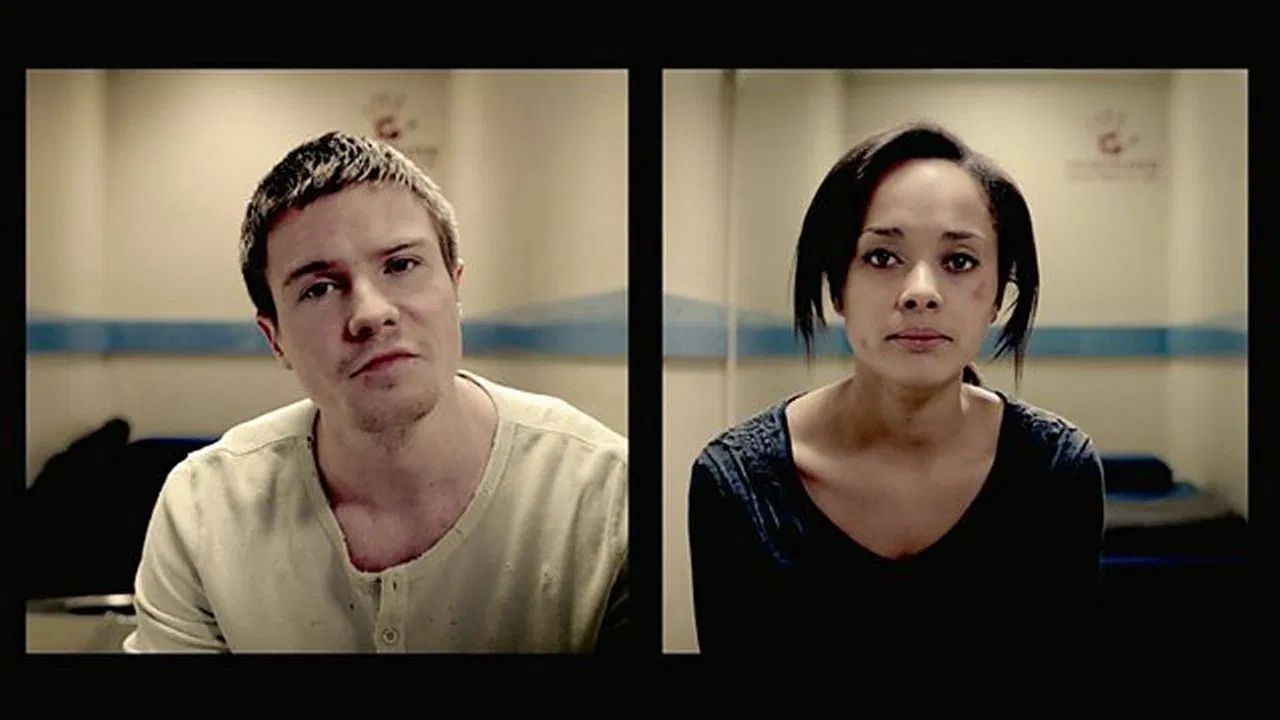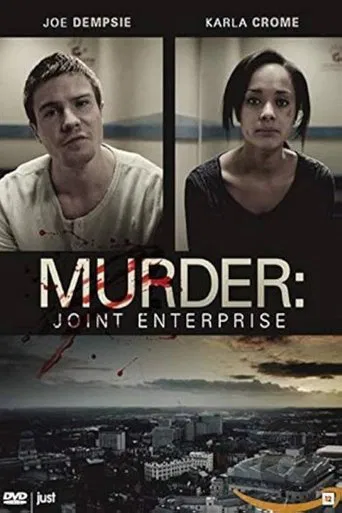

So, 'Murder: Joint Enterprise'. For some reason the BBC decided to schedule this in somewhat of a death slot - 10pm on a Sunday. This is an original take on the murder mystery and I want more of them. A girl has been murdered in her flat, her sister calls the police from the bathroom, where she's locked herself in, a man is arrested driving away from the scene in the victim's car. Throughout the hour the characters address the camera, giving us their various testimonies as we move through the initial questioning, charging and the court case. As we move through the days new information comes to light, we learn of new circumstances surrounding the night of the murder, new background to our characters, and with each monologue we must reassess what we thought we knew. I believe the concept came from watching cases unfold in court, and the way a jury hear the story of a crime from witnesses, the accused, the police, and lawyers. This creates a constant flux in opinions as gradually ideas solidify and we come to our own understanding of the case. It demonstrates how little one can really 'know' when being told not shown.The monologue style is a challenge on television. The actors cannot feel the audience reaction as they can onstage. Their utterances cannot be provoked by dialogue, or another character's physical behaviour. Visually the scene is static, something addressed here by the use of crime scene photographs, CCTV footage and video from a camera-phone intercut throughout the speeches. The monologues are entirely successful, mainly because the actors are great. Joe Dempsie was always the most talented of his 'Skins' generation, and he continues to prove so here. Karla Crome as Coleen plays vulnerable yet dangerous perfectly. As the only two people who know what happened on the night in question, and the entirety of their own backstories, they maintain the suspense, but brilliantly leading us further into the mystery.After the jury's judgement has been passed, we finally see the night of the crime in full. I doubt I'll be alone in thinking that this explicit resolution was unnecessary. There is a final hint from one character that I think allows us to come to this conclusion without being shown the scene, but equally some people will crave a clear, unquestionable solution. Robert Jones (the writer) being interviewed on Front Row before transmission said that if they make more dramas in the style of 'Murder', they might not show the solution. However they end them, with or without 'solving', I really want more of these. Please BBC, commission a series.
... View MoreI had not heard much about this one-off show other than it was by the maker of the original version of The Killing and that it had gotten good reviews from most critics. The manner of delivery is retrospective and almost entirely in the form of to-camera monologues by individuals, there is really only one scene where the characters directly interact and that comes right at the end. This means that, like most real life cases, you have the statements of those involved to go on and the writer makes this work really well, spinning perception to the point where you are not quite sure who did what to whom.As the case approaches we also get to see the manipulative nature of "justice"; the presentation, the little touches of coloring done by the lawyer and the way the facts are hard to get. It is a simple crime – a couple of sisters in a working man's club on their way to get matching, tacky tattoos but instead get picked up by a bloke and end up back at their rather dingy little flat, drunk, fighting and having fun. It is tawdry in nature and in a way is pretty representative of low-end crimes rather than the bigger complex affairs we see in season-long murder-mysteries. This does rather color the viewer but the film is careful not to judge the characters for where they are from, but instead lets them do the talking. The delivery is clever because it draws you in with different stories which are added to by the policeman, the lawyer, the mother, all adding perspective and opinion.The actual solution to the crime is satisfying but it is the total delivery that works so well. The cast are a big part of this working because they convince as characters – their anger, their tawdriness, their hate, their past hurts all seem part of them. Crome and Dempsie are both excellent in the two central roles and they hold attention effortlessly. Support from Pugh, Rushbrook, Dillane and the few others is almost as good and everyone gets the approach and follows the lead of Larsen and Jones. It is downbeat and it does deliberately lack the slickness of weekly crime dramas, but this is to its credit because the case is messy and isn't easily resolved.Well worth a look because it is engaging, intelligent, rewarding and grimly honest.
... View MoreMost murder mysteries begin around the time of the murder then follow the police as the question witnesses and examine clues and end when the culprit is exposed and arrested; the few that don't follow the trial and the truth will be exposed in court this is not like either of those though. This one hour story takes the form of a succession of people talking directly to the camera; suspects, police, witnesses a barrister, a pathologist and the victim's mother. They each tell us part of the story; what they think happened or what they want us to think happened. We see neither the investigation nor the trial.The case involves the murder of Erin, a twenty seven year old woman who was battered to death with an Amaretto bottle. At first the only suspect is Stefan, an ex-squaddie who was arrested while driving off in her car in a drunken state; later it becomes apparent that the victim had a fight with Coleen, her sister in the pub earlier so she becomes suspect number two. Both Stefan and Coleen tell us their stories; each is plausible just about. D.I. Sheehy gives his views of them and suggests what he things might have happened and when the trial begins Coleen's Barrister, Heskett Jupp, tells us what his strategy will be. As the story draws to an end one of the suspects will go to gaol and then we will finally see what happened on 'Day 0'; the day that Erin was killed.When I sat down to watch this I wasn't sure what to expect; all I knew about it was that it was directed by Birger Larsen; the director of the superlative Danish thriller 'The Killing' this couldn't be like that though as it was one hour long rather than twenty. I don't think I'd want to sit through twenty hours of people talking to camera but as a one hour show I thought it worked very well; giving the proceedings a documentary feel. The cast did a solid job and felt real; I suspect this was helped by the fact that apart from Robert Pugh they were all unknown to me. Most of the programme was filmed in fairly stark rooms but we did get the occasional outdoor view and these were filmed in a way that gave a interesting feel to the setting; the city of Nottingham looked deep orange or even red in the various night time shots. If you enjoy murder mysteries and don't mind the large amount of swearing then you'll probably enjoy this.
... View MoreThis hour-long film was first shown at 10pm on BBC2 on Sunday 26th August. It was this particular broadcast that I caught to watch this finely crafted, impeccably acted and thoroughly unsettling drama. The film's director is Birger Larsen, who fans of Danish crime shows might remember as having directed the first few episodes of the first series of the classic "Forbrydelsen" (The Killing), as well as some of "Those Who Kill" (less of a classic, but no less engrossing). With him at the helm, "Murder" is imbued with a hefty Scandi-esque gloom, whilst also accompanied with an extraordinary visual style that far exceeds its small screen confines, but works just as well within them: night-time cityscapes aglow in neon become overcast in clouds the colour of blood; flashbacks are shown as if shot in grainy 8mm; and, most at the forefront of the visual style, is the fact that all the characters relay events to camera, directly to us. They use this to-camera style as an opportunity to give their side of the convoluted, complex and disturbing story that unfolds before us...even if not all the points of view match up...and even if some of the characters happen to not be telling the whole truth. In the end, your sympathies, opinions, predictions and - most crucially - your trust become tested at every turn. Now, in a way, "Murder" reminded me of the outstanding Japanese film "Confessions", which is no bad thing. I won't explain how. It's best left for you to find out, and discover exactly why. The two lead actors deserve a special mention, too: Joe Dempsie (great in "Game of Thrones," brilliant in "The Fades") plays a man seemingly destined for unending pain and injustice, whether he's dealing it out himself, or receiving it in kind. And as for Karla Crome, who plays the sister of the victim (though not necessarily the only one) of the story? My lord, if she does not get the golden future in acting she so utterly deserves, I will eat my hat AND my shoe. Before "Murder," I saw her in the also quite brilliant (but totally mental) "Hit & Miss", and with her performance in that and in this to go on, I must paraphrase Ollivander and say that we can expect great things from you, Ms. Crome...
... View More